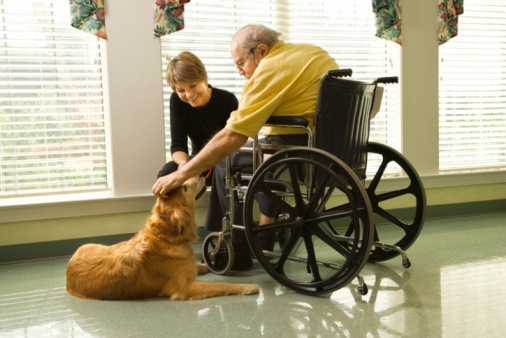“This post contains affiliate links, and I will be compensated if you make a purchase after clicking on my links.”

Dear Kevin,
I have an English Retriever Poodle named Raven, who is just under 2 years of age. She is so laid back and relaxed and I would like to see what it would take to make her a therapy dog. We are in Michigan and I am having problems finding information about it. Really thinking more in the nursing home and assisted living kind of settings.
Thank you!
Brenda R.
Hi Brenda,
That is awesome that you are considering therapy dog work with Raven. To my knowledge there are two options for where to get a dog certified. The options are Pet Partners (www.petpartners.org) and Therapy Dog International (www.tdi-dog.org). I would research both of those to see which will work better for you. From what I have heard, Pet Partners seems to be more for hospital visits and TDI is more for nursing homes and assisted living.
The requirements of the test do take some practicing. Your dog needs to be able to pass another dog without showing much interest. Another part of the test which is kind of difficult is your dog has to pass something tasty on the ground without going after it.
I recommend definitely getting into some basic/ advanced obedience to get Raven prepared for the test. (Maybe you already have.) But the more practice the better. A lot of training facilities offer some sort of Canine Good Citizen/ Therapy dog class. They may not be able to certify you, but they can at least get your dog the practice it needs. Another option could be private training. I offer this service. I like doing this because it gives the person/dog the individual attention that is needed for some of the difficult parts.
For anyone else that is reading this and is considering getting their dog certified I definitely recommend getting started sooner than later. Just about any dog has the potential to do this; it can just take a lot of training and socialization. A good thing to do is practice going into pet stores, or other “high traffic” areas where pet lovers are. Use these places to your advantage. If someone wants to pet your dog, practice having your dog sit to get the petting it is looking for. Don’t forget to use lots of positive reinforcement. This will help you yield the quickest results.
Thank you for the question!
Kevin Duggan CPDT-KA
Kevin is a Certified Professional Dog Trainer through the Certification Council for Professional Dog Trainers (CCPDT.org) and is a Canine Good Citizen Evaluator through the American Kennel Club. He currently resides in Ohio with his dog, V, a six-year-old Shepherd/Lab mix, where he operates All Dogs Go To Kevin, LLC, specializing in helping build positive relationships between humans and their canine companions using clear communication, not pain and fear. For more training tips and tricks, and to meet his amazing dog, V, follow him on Facebook by clicking here.
Do you have a tough training question of your own? Click HERE to “Ask the Trainer!”













Patti Shanaberg
Jan 23, 2014 at 1:50 pm
Great topic. However while it’s true that most any dog can be trained the skills required for therapy work aptitude is something else entirely and can not be trained. Dogs should enjoy rather than merely tolerate interaction with strangers in strange emotionally charged circumstances. Fewer dogs truly enjoy this than many assume. There are many differences between therapy dog registries that people should consider very carefully no matter where they would like to visit. It’s important not to be blinded by the warm and fuzzy when researching organizations to test or be involved with. Handler training, separate from dog training, is very important as there are many things handlers must know and be prepared for regardless of how well trained a dog is. Fast and easy is rarely best or adequate. It’s also important to inquire about those who are conducting and scoring tests. Have they completed specific training for that? How much training and experience are they required to have to conduct and score tests? Do animals AND handlers receive individual scores & feedback or is the focus primarily on the animal? Handlers are 50 % of the team but 100% responsible for the safety and effectiveness of the visit. It is also the handlers responsibility to properly advocate for their animal. Handlers should be specifically trained in recognizing subtle signs of stress in their animal among many other things related to this work. Unfortunately, the growing popularity of this work is drawing a lot of well intended people eager to get involved who are blinded by the warm and fuzzy of it all. Please prepare mindfully. Much more information at angelpawstherapy.org